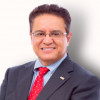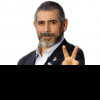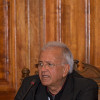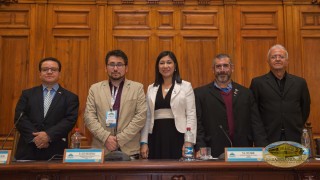The contribution of the Chair for Peace was the central theme for professors at the 2015 CUMIPAZ
The second worktable in Educational Session promotes the layout of a harmonized curriculum for the development of the integral human being.
Invited to reflect on Higher Education, specifically on "The contribution of the Chair for Peace in the formation of the development of the integral human being", professors and scholars from important universities in Panama, Spain, Argentina and Brazil formed the second worktable of Educational Session at the Integration for Peace Summit CUMIPAZ Chile 2015.
Various proposals were raised on the central theme, the main: promote the layout of a harmonized curriculum relevant to the training of professionals in pursuit of the development of the integral human being; having as a central axis the creation of the Chair for Peace.
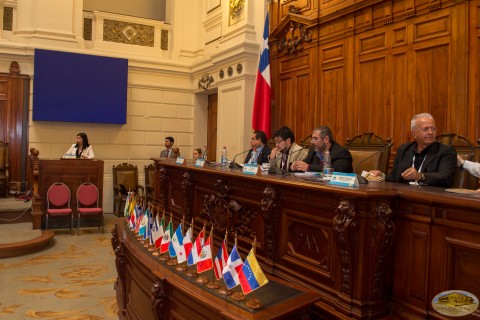
Another key point was to promote projects and collaborative paradigms of academic programs, which contribute to the process of building a culture of peace. For this reason, some proposals and college experiences as part of studies and activities related to peace were presented; among them: the International Alliance of Universities for Peace (ALIUP).
It also raised a proposal to establish valid mechanisms to enable the publication of academic papers, product of ALIUP and its members, through a virtual space that can serve as a reference platform for institutions of all levels of the education system on issues related to an integral education of values.
Dr. Luci Bento from Nihon Gakko University of Paraguay, was in charge of moderating this table.
Following the intervention of academics, a space for analysis, reflection, questions and contributions from the select audience was opened. The
main ideas of this day were embodied by a team of rapporteur for the presentation of the results in a plenary session in the hall of honor of former Congress of Chile.
The results of the conclusions and contributions of this second table, like the other working groups of the Educational Session will be considered and incorporated into the Declaration of CUMIPAZ 2015, on the axis of education for peace, which will be presented before various organizations and governments internationally.
University initiative in Panama promotes progress and peace of nations
Dr. Oscar Leon Oliva, Director of the Quality Leadership University (QLU) Panama; presented in his speech the Panama International Forum, which emerged in 2006 as an initiative of a group of undergraduates, aiming to improve their communication skills, dialogue and understanding of global issues. He mentioned that it has become an annual event that attracts between one hundred and three hundred students from different schools and universities in Panama and other countries.
"We know that by supporting this initiative we are helping the students develop as leaders," said Dr. Oscar.
In turn, he explained that in this event the students follow the UN model debate, choosing regional, national and global issues to discuss, working on issues such as the Commission on Human Rights. He commented that after discussions the students issue resolutions, which are published as contributions to the politicians and parliamentarians in support of national and international development.
Finally, he proposed: "... that this model used in Panama, which is also used in other countries, be adopted by most universities to develop in our students the communication skills, leadership, the ability to focus on global problems so our students are formed consciously, and can contribute to the progress and peace of nations.”
Characteristics and challenges of a Chair for Peace
On behalf of the European continent, Dr. Alex Ivan Arevalo, a member of the Interuniversity Institute of Social Development and Peace, and UNESCO Chair of Philosophy for Peace at the University Jaume I de Castello and University of Alicante (Spain), made an analysis of the characteristics and challenges of training by a chair of peace.
Among the main points he mentioned, understanding the invisible violence, study the structures behind the origin of violence, to understand and deal with conflicts; in turn, it proposes the formation in positive key, change the negative outlook for alternatives and different ways, "we need to show students from civil society and from organizations, that there are proposals for peace," he said.
At a level of study for peace, he also presented an approach called "History of Peace" which is being developed in several European universities and in some Latin American countries; this approach seeks to rescue moments, spaces and historical figures in which cooperation and solidarity among nations has been promoted.

Another feature that Dr. Arevalo considered necessary in education for peace is to encourage activism. “Students need to be connected to their problems at the local and national level, so teachers have to encourage participation at a level of educational dynamics, with social organizations, foundations, social movements, NGOs to internalize the problems of their environment,” he said.
On the other hand, as a layout for studies related to peace, he commented on the project of the Jaume I University and its program of research, education and awareness; mainly from two graduate programs in the field of study of peace, these being pioneers in the Spanish and Ibero-american countries.
Education as a basis for development and peace
For his part, Prof. José Luis Imaín, of the National University of Tucuman (Argentina), Secretary of the Federation of University Teachers (FEDUN), spoke about the priority that the discussion on the contents of the academic curriculum, "our need for workers in the education sector and, in particular, college education should have, to discuss beyond wages, to discuss relationships or needs, the contents of how,” he urged.
In this sense, he commented on the creation of the Educational Research Institute (IPE) for Latin America and the Caribbean; which is dedicated to studying the whole issue of education in Latin American countries.
In the framework of education for peace, Prof. Imaín spoke of the commitment to develop a program for social action, a model of involvement with the community outreach; where development and human promotion is generated, defining participation in human dimensions (cognitive, emotional, spiritual, social, personal, sexual, physical).
"It is necessary to have this holistic view, to interpret and bring our professional cloisters with feeling and sense of solidarity. Because those are the conditions we need to develop the individual and develop and with a view where peace is not a euphemism, but a result of political practices and actions of citizens in this society of knowledge for action", he pointed.
In addition, he raised as a proposal, creating a virtual channel through ALIUP, by means of sharing of experiences and actions at an international level, for education on issues, practices or projects related to peace and development of nations. "Education is the foundation for development and peace," he said.
Education to save the world
Prof. Antonio Cerqueira, a professor at the University of Fortaleza (UNIFOR) and Federal Attorney of Military Justice of Brazil, presented an overview of the educational system of this country. In this regard, he said that currently Brazil does not have education as a priority, and by not contemplating compulsory education it has affected the high rates of juvenile crime that exists in the nation.
However, he described the scope of the UNIFOR, including several details, said that this institution has been concerned about human rights and humanitarian rights. He said that this highest seat of learning has several agreements with various universities in America and Europe, currently with more than forty thousand students and has twenty percent of their scholarships for students who cannot afford the costs.
"The perception I have is very clear, education, and only education is capable of saving humanity," said Prof. Cerqueira.

